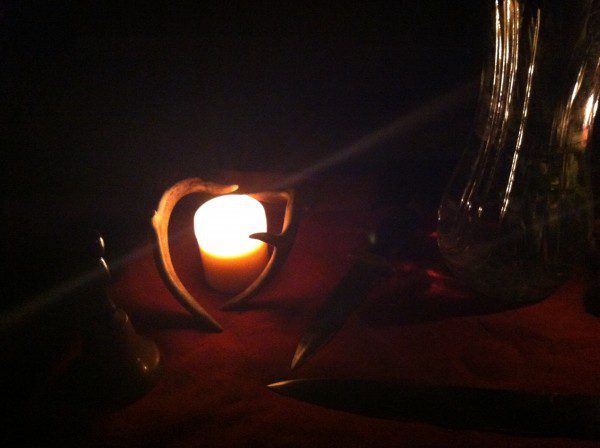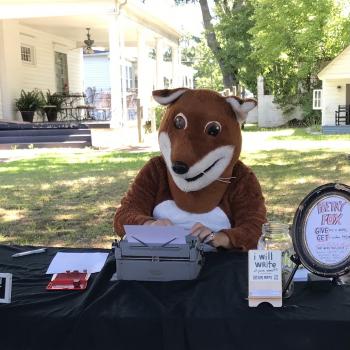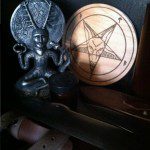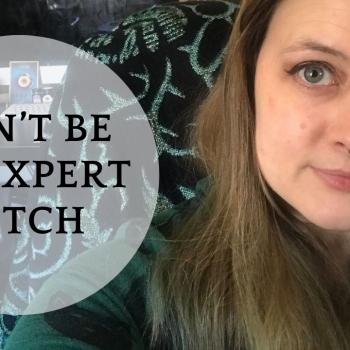 That first religious studies class is often something of a shock to new students. A lot of people come in thinking that we’re going to be proponents of whatever religion we’re examining. That we’re here to turn students into priests or affirm whatever their pastors tell them in church. Lots of kids drop once they realize that we expect them to be critical and that we discourage confessional perspectives. For students who stick around, another surprise quickly follows: religion is not a monolithic thing that we can define with a checklist, even within a single tradition. There is no single thing called “Christianity” (or whatever) that we can all recognize and objectively agree upon. Instead, we speak in terms of “Christian traditions” or “Christianities,” which we then define broadly, careful to establish context as we narrow so that readers understand exactly who is included. Students are never permitted to say lazy things like, “Christians believe…” or “In Christianity…” or some such. They must specify which and provide context.
That first religious studies class is often something of a shock to new students. A lot of people come in thinking that we’re going to be proponents of whatever religion we’re examining. That we’re here to turn students into priests or affirm whatever their pastors tell them in church. Lots of kids drop once they realize that we expect them to be critical and that we discourage confessional perspectives. For students who stick around, another surprise quickly follows: religion is not a monolithic thing that we can define with a checklist, even within a single tradition. There is no single thing called “Christianity” (or whatever) that we can all recognize and objectively agree upon. Instead, we speak in terms of “Christian traditions” or “Christianities,” which we then define broadly, careful to establish context as we narrow so that readers understand exactly who is included. Students are never permitted to say lazy things like, “Christians believe…” or “In Christianity…” or some such. They must specify which and provide context.
Here in the Pagan blogosphere, most of us probably have a handle on the idea that Paganism, likewise, is not a single thing. Instead, we really should speak of Paganisms. But that plural applies to individual traditions, too. There is no monolithic Wicca. There are Wiccas. There isn’t even one Gardnerian Wicca, but Gardnerian Wiccas. This isn’t because of some inherent flaw in any tradition, but rather because religion doesn’t develop independently of the people practicing it. This is as true of Wiccans as it is Christians or anyone else. But those of us on the inside of any one tradition will likely have some pretty specific ideas about who’s inside and who’s outside.
The scholar in me knows that diversity is probably inevitable and I don’t get to draw lines about who’s “doing it right” or “real” just to support whatever personal agenda I have. The practitioner in me, however, just as an example, thinks that some people calling themselves Gardnerians are nothing of the sort.
Deep down (or maybe right on the surface), whatever your tradition, I’ll bet you’ve got your own prejudices, too. Maybe they’re reasonable, and maybe they aren’t. Maybe you wish you didn’t, or maybe you think they’re important. But, whatever the case, I bet they’re there.
So there. I said it.
There are different kinds of Wiccans in the world and we don’t all agree and get along. That’s true within any one Wiccan tradition, too.
Talk to most elders (or, really, anyone who’s been on the Internet for a while) and they’ll go, “Duh.”
Then you’ll get a dramatic anecdote about a kerfuffle that happened before you were born (these are priceless—bring whiskey).
But I think these distinctions—these nuances in practice, to speak gently—are lost on a lot of newcomers. The idea of a big, unified family spanning continents and the astral is really intoxicating. Indeed, that sense of and desire for community and belonging is what attracts many seekers in the first place. It can be truly shocking—and create some serious cognitive dissonance—to find out that such splits exist. I don’t know if it’s just a question of romantic idealism, or of people simply not knowing their history. It may be sad for some, but it really shouldn’t be surprising.
Even if we grant that we’re all witches, or even that we’re all Wiccans, we are surely practicing different witchcrafts.
I’m okay with this. I also know there’s nothing I could do about it even if I weren’t. But it does raise practical concerns, especially for those of us who are bound by traditional oaths. How do we navigate shared spaces, knowing that such differences exist, without either disrespecting others or violating our sacred commitments to secrecy?
I spend a lot of time with this because I do a lot of traveling and have a lot of interaction with other Wiccans. Some are Gardnerians, and many others practice other traditional or eclectic forms of Wicca. I have deep respect for many practitioners who are very different from myself.
On many occasions, I’ve been put in positions where it’s clear that I’m expected to share something I feel is oathbound because the other person believes we’re practicing the same thing. There have been many more occasions where people have shared information with me, and I’ve thought, “Holy crow I can’t believe they’re telling me something so personal.” These intimate exchanges are usually quickly justified with, “It’s just Wiccans here,” or “Everyone is an initiate,” as though we’re obviously using those terms in identical ways or that saying so automatically makes a stranger any less of a stranger.
No matter your tradition (or your not-tradition), it can feel super awkward to be put into a position where you’re expected to disclose something that feels too private. How to deal?
First, I remind myself that the whole point of interacting with other witches is to share and advance each other’s practices. And this is always a good thing, in my book. But people have different ideas about what is private and what isn’t. Most of the time, in discussion, folks genuinely aren’t “fishing” for secrets. In fact, they think they already have your secrets (you’re all Wiccans, right?). What they want is clarity, depth, or maybe just solidarity. And those are things we can offer without getting overly private, in the same way it’s possible to talk generally about sex without compromising your personal intimate activities. I can talk about deepening a personal connection to the sabbats without disclosing the actual rites I practice. I can talk about polytheistic devotion without revealing the specifics of the relationships I have with my gods, or even their identities. I think this ability to generalize is important, and I try to cultivate it in my own coven. It’s possible to learn from others and to share with them in return without anyone’s privacy being violated. We do it all the time in mundane conversations about finances, health, parenting, and relationships. We need to be able to do it in Craft practice, too. Instead of focusing on the details of the discussion (e.g. the specific text of my ritual invocation), I try to think about underlying questions or issues (perhaps how to pull off an invocation, or literary allusions in historical invocations). Usually the underlying stuff doesn’t require spilling our Innermost Secrets.
Second, I’m mindful of my own questions. The types of questions we ask of others can reveal more about ourselves than we intend. Truthfully, I restrict questions pertaining to oathbound things to people within my own immediate family (or keep it to my journals for private contemplation). I might participate in a general conversation about, say, organizing a coven activity or vetting a seeker, but anything about my personal practice of Wicca makes the best sense when directed at people who I know practice as I do. At the very least, I should save it for people I’ve shared intimate space with and trust. Using the same labels and the same forums shouldn’t automatically trigger the spilling of what’s supposed to be precious. There’s a difference between being a fellow witch and being a fellow witch in your coven, no matter what sort of tradition you may belong to.
Finally, I accept that sometimes people will think I’m a snob. I made a promise to preserve my tradition as it was passed to me, not to be everyone’s best friend. I’m pretty sensitive. I don’t like confrontation, and I’d prefer to be well-liked and known for being friendly and open-handed, but that’s just not going to be possible all the time. I work really hard to occupy that shared space where I can be helpful and encouraging, but simultaneously adhere to the secrecy of an oathbound tradition.
Whether or not we’re part of any tradition at all, I think witchcraft is necessarily intimate. All of us engage in Mysteries that belong only to us (many we couldn’t share even if we wanted to). At the same time, many of us long for community. We have to find our own space in between and respect other witches’ right to do likewise. In time, experience teaches us better discretion, I think (which, again, still looks different for different people). Other people’s oaths—outside of the oaths I have myself collected—have nothing to do with me. I don’t get to decide what is and isn’t secret for them, and if I try to call someone out publically, what I’m really doing is revealing my own secrets. I become the oathbreaker when I draw attention, unintentionally confirming truth in the violation.
Silence is hard. Figuring out where our personal boundaries are is hard. But if oathmaking was easy, it wouldn’t carry the weight that it does. There are many Wiccas, but I think that respect for the intimate nature of the Mysteries has to be part of what makes us recognizable to each other.















